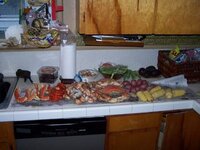- Messages
- 296
- Reactions
- 46
Guys,
I've done some searching on the forum and read a lot about preparing for a BIG event.
My wife and I were talking and she now feels we should be better prepared for some disaster.
I know you guys have tried hundreds of different MRE by a many manufacturers.
Who do you think makes the best MRE's?
Offers the best varitey?
Best prices?
Thanks
I've done some searching on the forum and read a lot about preparing for a BIG event.
My wife and I were talking and she now feels we should be better prepared for some disaster.
I know you guys have tried hundreds of different MRE by a many manufacturers.
Who do you think makes the best MRE's?
Offers the best varitey?
Best prices?
Thanks












